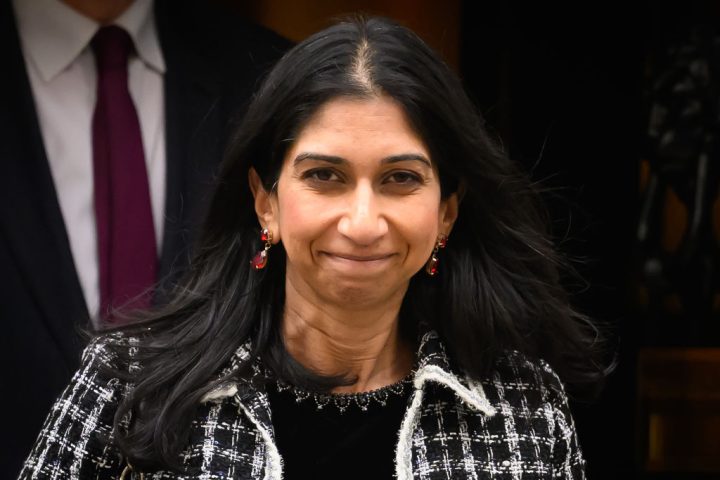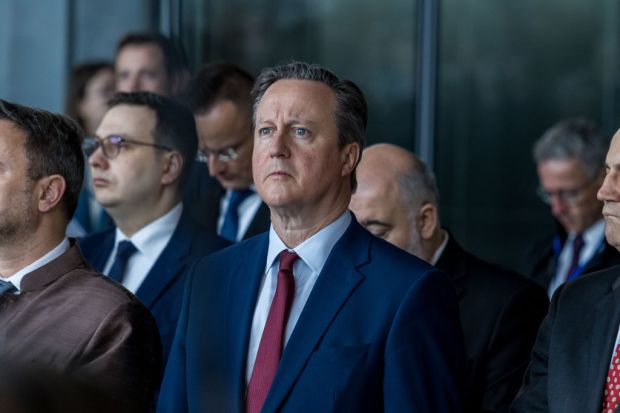It’s not the genuine asylum seekers that Suella Braverman and her crew are determined to prevent reaching our shores, we are often told. It’s the illegals. With our traditional British values of tolerance and fair play, we are one of the most welcoming nations on earth to those in real need. The issue is, we hear again and again, with those who show contempt for the rule of law and turn up in this country without permission.
That all sounds, on the face of it, a perfectly reasonable position: kindness to genuine refugees in a humanitarian crisis; stern measures for criminals and opportunists. And how do we separate the two? Why, the ones who apply through legal routes will have their applications given due consideration; whereas the people who just turn up on boats will have their applications summarily rejected. Again, all tickety-boo – as long as these vaunted legal routes actually exist.
It’s just babyish to accept the rights of refugees to asylum and insist that it’s anyone else’s problem but ours
The problem here is that nobody in a government which spends so much time and energy on the question seems to be able to point to one. The fact that we have made generous exceptions for Hong Kong and Ukrainian citizens on an ad hoc basis doesn’t obviate the problem: rather, it implies a capricious two-tier system led by headlines rather than a disinterested universalism.
I’m intending to make a procedural point here, though, not a moral one. We can and will disagree hotly about whether we imagine the small boats washing up on our shores are filled, for the most part, with drug criminals and rapists hoping to take advantage of soft-touch Britain, or with desperate people risking their lives to flee some of the worst situations on earth. No doubt both camps will be represented in some proportions. But we can probably at least agree that being people-trafficked across the channel in rubber dinghies is not the ideal way for anyone to arrive in this country, and that it makes the sheep-from-wolf sorting process a giant headache for everyone.
So let’s take it as a given that we can and should stop this means of seeking asylum. And let’s consider – as a practical matter – the alternatives. Let us imagine a hypothetical refugee from a real war: an elderly man, say, or a young woman with a child, fleeing Libya, Syria, Afghanistan, Sudan, or any other war in which Britain may or may not have had a hand.
Perhaps we suspect that fifty per cent, or eighty per cent, or ninety per cent of those who present themselves as such are, in fact, economic migrants, wannabe welfare cheats, Albanian drug mules or jihadist infiltrators. But even if we may not agree about how many of such people there are we can agree that they do exist. We can admit that genuine refugees are a thing, right?
If you are such a refugee, what is the proper means by which you can seek asylum in Britain? We know that the moment you entrust yourself to a small boat, you have, by HMG’s lights, rendered yourself illegal. By extension, if you go to the bottom of the sea or find yourself on the first flight out to Rwanda, you are getting no more than you asked for. So what are you supposed to do?
Here’s where the procedural point turns into a moral one. If the answer is that there is no legal route, that the Venn diagram of ‘illegal migrants’ and ‘any refugees at all’ is a circle, then this high-toned crackdown on illegal immigration would look not like a principled upholding of the rule of law so much as a language-game, a catch-22, a cruel and cynical con.
If you think the wretched of the earth deserve no right of asylum at all, then, sure, you’ll be happy with such a state of affairs. If you think refugees might deserve help, but that giving them that help is not our problem – that it’s up to whichever country they first escape to to do what it can, and tough luck on them – then, again, this situation sits easily enough with you. But I struggle to believe most Britons fall into either of these categories.
‘I’m all right, Jack,’ is not regularly listed among those British values that the flag-waving community likes to go on about. The duty to give succour to the afflicted – and the idea that it’s a responsibility shared by us all – isn’t some faddish article of virtue-signalling wokeist bedwettery: it’s in the marrow of the Abrahamic religions, and a majority position in international law. It may be cruel to refuse to recognise any right of asylum, though at least it has the virtue of candour. It’s just babyish to accept the rights of refugees to asylum and insist that it’s anyone else’s problem but ours.
I’m pretty sure that, however tough it likes to talk, the government doesn’t really imagine those positions are a vote-winner either. So the current policy seems to be to ensure there’s no legal route to seek asylum in this country, just in case it turns out there are so many genuine refugees that the figures give electoral succour to the Faragists, while pretending otherwise.
Suella Braverman has previously struggled, when asked in select committees, to name any legal route to asylum that currently exists or is envisioned by her department. The latest wheeze seems to be to say that the legal route is for refugees to apply for asylum in the UK is via the UNHCR.
She trotted this out early last week in an interview with Sky’s Kay Burley. ‘There is no good reason,’ she said, ‘for anybody to get into a small boat. If you are someone fleeing Sudan for humanitarian reasons there are various mechanisms you can use. The UNHCR is present in the region and they are the right mechanism by which people should apply if they do want to seek asylum in the United Kingdom.’
Robert Jenrick, the immigration minister, parroted the same line in parliament, advising would-be asylum-seekers to ‘present to the UNHCR. We already operate safe and legal routes with them’. The problem was that it wasn’t true when Ms Braverman said it, and it wasn’t true then. The SNP’s Alison Thewliss quoted a written statement from the UNHCR saying ‘There is no mechanism through which refugees can approach UNHCR with the intention of seeking asylum in the UK.’
Would Mr Jenrick correct the record? Er, no. He retorted that, ‘Whatever the honourable lady may be quoting from her iPhone, I would prefer to take at face value what I have heard in discussion with the assistant commissioner.’ Trust what I like to think I heard, then, rather than what the organisation has said in black and white on the record. With the greatest of respect to Mr Jenrick, I’m not sure how long that position is sustainable.
If the government really doesn’t think we have any obligation to genuine asylum seekers, and we really have no interest in developing a means to help them, wouldn’t the brave thing to do to be to say as much out loud?
Got something to add? Join the discussion and comment below.
Get 10 issues for just $10
Subscribe to The Spectator Australia today for the next 10 magazine issues, plus full online access, for just $10.





















Comments
Don't miss out
Join the conversation with other Spectator Australia readers. Subscribe to leave a comment.
SUBSCRIBEAlready a subscriber? Log in